名词性从句的翻译
名词性从句翻译
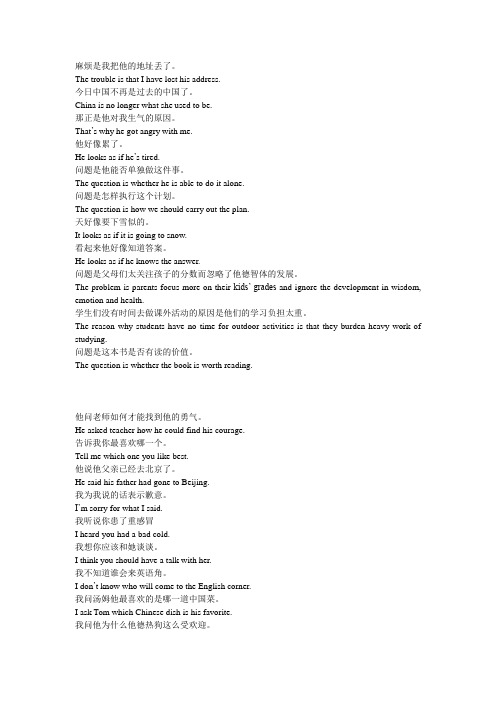
麻烦是我把他的地址丢了。
The trouble is that I have lost his address.今日中国不再是过去的中国了。
China is no longer what she used to be.那正是他对我生气的原因。
That’s why he got angry with me.他好像累了。
He looks as if he’s tired.问题是他能否单独做这件事。
The question is whether he is able to do it alone.问题是怎样执行这个计划。
The question is how we should carry out the plan.天好像要下雪似的。
It looks as if it is going to snow.看起来他好像知道答案。
He looks as if he knows the answer.问题是父母们太关注孩子的分数而忽略了他德智体的发展。
The problem is parents focus more on their kids’ grades and ignore the development in wisdom, emotion and health.学生们没有时间去做课外活动的原因是他们的学习负担太重。
The reason why students have no time for outdoor activities is that they burden heavy work of studying.问题是这本书是否有读的价值。
The question is whether the book is worth reading.他问老师如何才能找到他的勇气。
He asked teacher how he could find his courage.告诉我你最喜欢哪一个。
Tell me which one you like best.他说他父亲已经去北京了。
名词性从句的翻译
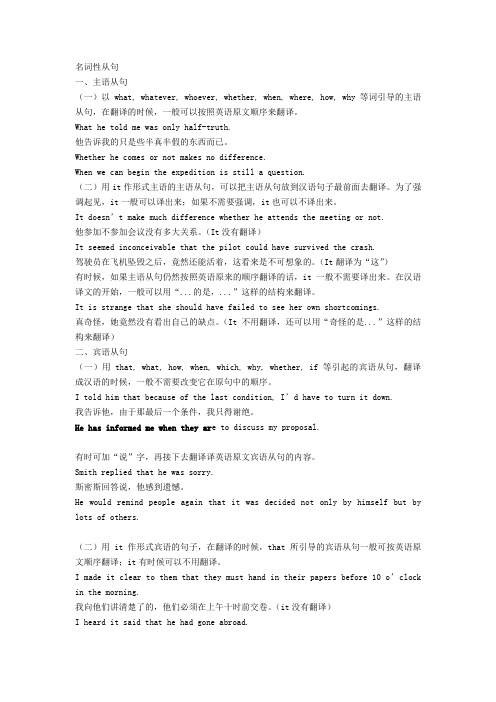
名词性从句一、主语从句(一)以what, whatever, whoever, whether, when, where, how, why等词引导的主语从句,在翻译的时候,一般可以按照英语原文顺序来翻译。
What he told me was only half-truth.他告诉我的只是些半真半假的东西而已。
Whether he comes or not makes no difference.When we can begin the expedition is still a question.(二)用it作形式主语的主语从句,可以把主语从句放到汉语句子最前面去翻译。
为了强调起见,it一般可以译出来;如果不需要强调,it也可以不译出来。
It doesn’t make much difference whether he attends the meeting or not.他参加不参加会议没有多大关系。
(It没有翻译)It seemed inconceivable that the pilot could have survived the crash.驾驶员在飞机坠毁之后,竟然还能活着,这看来是不可想象的。
(It翻译为“这”)有时候,如果主语从句仍然按照英语原来的顺序翻译的话,it一般不需要译出来。
在汉语译文的开始,一般可以用“...的是,...”这样的结构来翻译。
It is strange that she should have failed to see her own shortcomings.真奇怪,她竟然没有看出自己的缺点。
(It不用翻译,还可以用“奇怪的是...”这样的结构来翻译)二、宾语从句(一)用that, what, how, when, which, why, whether, if 等引起的宾语从句,翻译成汉语的时候,一般不需要改变它在原句中的顺序。
I told him that because of the last condition, I’d have to turn it down.我告诉他,由于那最后一个条件,我只得谢绝。
名词性从句汉译英
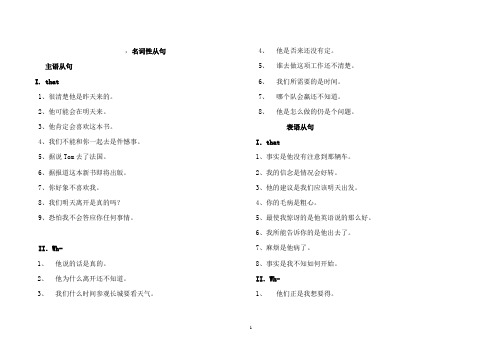
,名词性从句主语从句I. that1、很清楚他是昨天来的。
2、他可能会在明天来。
3、他肯定会喜欢这本书。
4、我们不能和你一起去是件憾事。
5、据说Tom去了法国。
6、据报道这本新书即将出版。
7、你好象不喜欢我。
8、我们明天离开是真的吗?9、恐怕我不会答应你任何事情。
II.Wh-1、他说的话是真的。
2、他为什么离开还不知道。
3、我们什么时间参观长城要看天气。
4、他是否来还没有定。
5、谁去做这项工作还不清楚。
6、我们所需要的是时间。
7、哪个队会赢还不知道。
8、他是怎么做的仍是个问题。
表语从句I.that1、事实是他没有注意到那辆车。
2、我的信念是情况会好转。
3、他的建议是我们应该明天出发。
4、你的毛病是粗心。
5、最使我惊讶的是他英语说的那么好。
6、我所能告诉你的是他出去了。
7、麻烦是他病了。
8、事实是我不知如何开始。
II.Wh-1、他们正是我想要得。
2、问题是它是否值得一做。
3、问提是我们该作些什么来帮助他。
4、问题是谁留下。
5、那就是他出生的地方。
6、我们就是这样分手的。
7、我是你正在找的那个人。
8、这就是我去那的原因同位语从句I.that1、我听到了我们队获胜的消息。
2、他在会上什么都没说的事实使我们惊讶。
3、他打算来的消息使我们高兴。
4、他已经下定学好英语的决心。
5、他当选的消息不是真的。
II.Wh-1、我不知道他什么时候来。
2、你不知道我多么着急。
3、很难回答你提出的我是如何做的问题。
4、我提出的如何邀请他的问题已经得到了解决。
5、你为什么对音乐感兴趣的问题还没回答。
宾语从句I. That clause1,我认为他们学习很努力。
2,他说他将在11日动身。
3,他告诉我医生马上就来。
4,他说他妈妈在读书。
5,他说他的爸爸生于1948年。
6,我恐怕犯了一个错误。
7,我们有把握成功。
8,对不起我错拿了你的钢笔。
II.Whether/ if1,我想知道他明天是否来。
2,我想知道你是否愿意和我一起去看足球赛。
英语八大从句类型例句
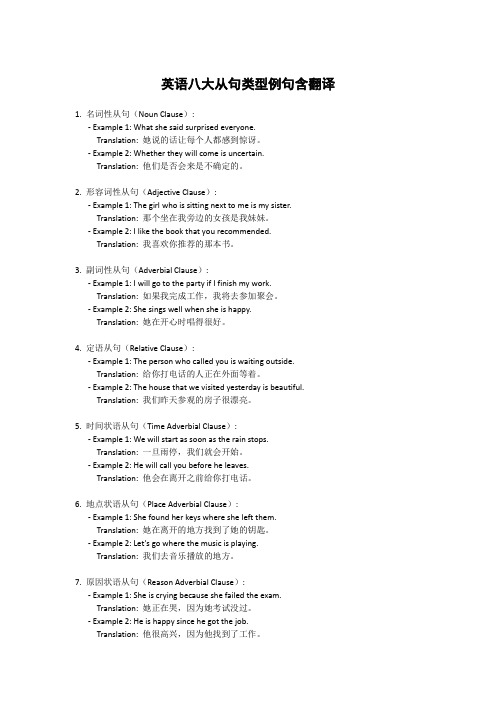
英语八大从句类型例句含翻译1. 名词性从句(Noun Clause):- Example 1: What she said surprised everyone.Translation: 她说的话让每个人都感到惊讶。
- Example 2: Whether they will come is uncertain.Translation: 他们是否会来是不确定的。
2. 形容词性从句(Adjective Clause):- Example 1: The girl who is sitting next to me is my sister.Translation: 那个坐在我旁边的女孩是我妹妹。
- Example 2: I like the book that you recommended.Translation: 我喜欢你推荐的那本书。
3. 副词性从句(Adverbial Clause):- Example 1: I will go to the party if I finish my work.Translation: 如果我完成工作,我将去参加聚会。
- Example 2: She sings well when she is happy.Translation: 她在开心时唱得很好。
4. 定语从句(Relative Clause):- Example 1: The person who called you is waiting outside.Translation: 给你打电话的人正在外面等着。
- Example 2: The house that we visited yesterday is beautiful.Translation: 我们昨天参观的房子很漂亮。
5. 时间状语从句(Time Adverbial Clause):- Example 1: We will start as soon as the rain stops.Translation: 一旦雨停,我们就会开始。
英语从句的翻译
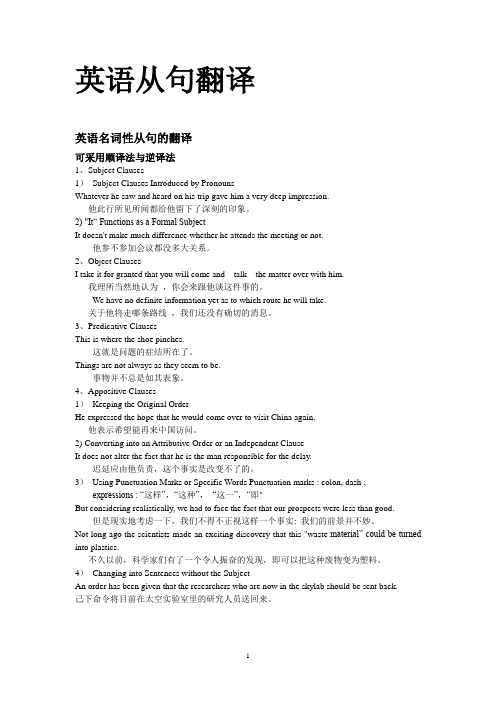
英语从句翻译英语名词性从句的翻译可采用顺译法与逆译法1、Subject Clauses1)Subject Clauses Introduced by PronounsWhatever he saw and heard on his trip gave him a very deep impression.他此行所见所闻都给他留下了深刻的印象。
2) "It“ Functions as a Formal SubjectIt doesn't make much difference whether he attends the meeting or not.他参不参加会议都没多大关系。
2、Object ClausesI take it for granted that you will come and talk the matter over with him.我理所当然地认为,你会来跟他谈这件事的。
We have no definite information yet as to which route he will take.关于他将走哪条路线,我们还没有确切的消息。
3、Predicative ClausesThis is where the shoe pinches.这就是问题的症结所在了。
Things are not always as they seem to be.事物并不总是如其表象。
4、Appositive Clauses1)Keeping the Original OrderHe expressed the hope that he would come over to visit China again.他表示希望能再来中国访问。
2) Converting into an Attributive Order or an Independent ClauseIt does not alter the fact that he is the man responsible for the delay.迟延应由他负责,这个事实是改变不了的。
名词性从句翻译
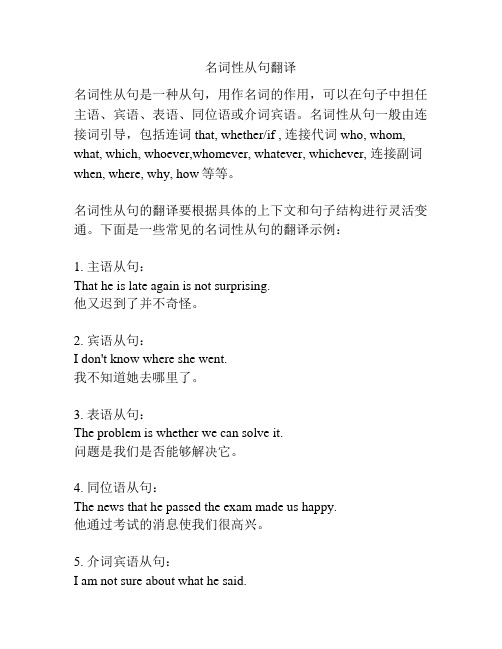
名词性从句翻译名词性从句是一种从句,用作名词的作用,可以在句子中担任主语、宾语、表语、同位语或介词宾语。
名词性从句一般由连接词引导,包括连词that, whether/if , 连接代词who, whom, what, which, whoever,whomever, whatever, whichever, 连接副词when, where, why, how等等。
名词性从句的翻译要根据具体的上下文和句子结构进行灵活变通。
下面是一些常见的名词性从句的翻译示例:1. 主语从句:That he is late again is not surprising.他又迟到了并不奇怪。
2. 宾语从句:I don't know where she went.我不知道她去哪里了。
3. 表语从句:The problem is whether we can solve it.问题是我们是否能够解决它。
4. 同位语从句:The news that he passed the exam made us happy.他通过考试的消息使我们很高兴。
5. 介词宾语从句:I am not sure about what he said.我不确定他说的是什么。
6. 间接引导名词性从句:He asked where I lived.他问我住在哪里。
7. 是否从句:I wonder whether/if she will come to the party.我想知道她是否会来参加派对。
8. 选择性从句:He asked me whether I preferred coffee or tea.他问我是喜欢咖啡还是茶。
9. 宾语从句(陈述句变为疑问句):Do you know what time it is?你知道现在几点钟吗?10. 宾语从句(连接代词):I wonder who is going to pick us up at the airport.我想知道谁会在机场接我们。
课件10 名词性从句的翻译
3) 加入冒号、破折号和 “这样”、“这一”、“即”等字眼
But
considering realistically, we had to face the fact that our prospects were less than good. 但在实事求是地考虑一番之后,我们不得不正 视这样一个事实:我们的前景并不妙。 Influenced by these ethics, the new generation live under the delusion that money does not stink. 受这种道德观念的影响,青年一代生活在这样 一种错觉中,以为金钱总是香喷喷的。
Most
remarkable of all is the fact that each question was decidedly consensus, thus enhancing prospects that the treaty will win approval when it comes up for ratification.
7
宾语从句
以that,
what, how引导的 宾语从句 句
以it作形式宾语的宾语从
1) 以that, what, how引导的宾语从句
一般按原句顺序翻译
I
told him that I had to turn him down. 我告诉他我不得不拒绝他。 Did you hear what I said? 你没听见我的话吗? I told him how appealing I found the offer. 我告诉他,这个机会对我有着多么大的吸引 力。
2) 译为类似定语的结构或独立句
名词性从句的翻译
1.他所再三强调的就是, 不管多么困难, 他们决不应该后退寸步. 2.就这样, 小国战胜了大国.
四. 同位语从句
1. An obedient son, I had accepted my father’s decision that I was to be a teacher, though the prospect interested me not at all. 2. Her son, my employer’s nephew, was himself an assistant in the shop. 3.From the very beginning, the fact that I was alive was ignored.
3.他参不参加会议都没有多大关系. (由who, what , which, whoever等引导 的主语从句通常在译文中做主语.) 4.很明显,某些高级人物在玩弄权术, 而我却成了他们的工具. 5.真奇怪,他竟然没有看出自己的缺 点.
“It +形容词+that从句”结构中,将形 容词译成汉语的副词短语,会使译文 更加符合汉语的表达习惯;这与“ it is + 名词+that从句”结构的译法相类 似. 例:It is a pity that you missed such a fine talk. It’s not your fault that this has happened.
因此,我不得不有所取舍。不过我 希望我已经描述了那些影响过我, 并仍在塑造我的世界,丰富我的人 生的事件和人物。
名词性从句的翻译
一. 主语从句
1. Whatever he saw and heard on his trip gave him a very deep impression. 2. It is important that the hotel receptionist make sure that guests are registered correctly.
什么是名词性从句
什么是名词性从句?名词性从句(Noun Clauses)是一个在句子中充当名词的从句。
它可以在句子中担任主语、宾语、表语或补语的角色。
名词性从句通常由连词引导,例如that, whether, if, who, whom, whose, what, which, when, where, why等。
以下是名词性从句在不同角色中的示例:1. 主语(Subject):- What she said surprised me.(她所说的让我感到惊讶。
)- Whether we go or not is up to you.(我们去与否由你决定。
)2. 宾语(Object):- I know that he is coming.(我知道他要来。
)- She asked me where I was going.(她问我要去哪里。
)3. 表语(Predicate):- The problem is how to solve it.(问题是如何解决它。
)- His wish is that everyone gets along.(他的愿望是每个人和睦相处。
)4. 补语(Complement):- The important thing is what you do next.(重要的是你接下来要做什么。
)- His goal is to become a doctor.(他的目标是成为一名医生。
)名词性从句的使用可以使句子更加丰富和灵活,它可以替代一个独立的名词,并在句子中承担相应的语法角色。
名词性从句可以用于各种不同的语境,包括陈述句、疑问句和感叹句等。
需要注意的是,名词性从句的引导词可以根据从句的具体内容和功能而有所不同。
因此,在使用名词性从句时,我们需要根据语境和句子的需要选择适当的引导词。
了解和掌握名词性从句的概念和用法,可以帮助我们在英语表达中更加灵活和准确地使用不同类型的从句。
翻译技巧 8 名词性从句的翻译
翻译技巧8 名词性从句的翻译1. 主语从句* 以what、whatever等代词引导的主语从句,一般可采用直译。
1)What really concerns us is when our order is ready for shipment.真正让我们担心的是我们的订货什么时候可以准备装船。
2) Whatever you say cannot make us reduce our price any further.不管你们怎么说,我们不能再减价了。
3) What you should pay attention to is that claim must be made within the term of validity stipulated in the contract.必须注意的是,索赔必须在合同规定的有效期内提出。
* 以it为形式主语引导的主语从句,翻译较为灵活。
4) From what you say, it is possible that we have made some mistake in the delivery of the goods meant for you.根据贵方的来函所述,我方有可能在为贵方备货发运时出了差错。
5) It has also been observed that in many countries it is difficult for a foreign company to obtain not only the import license, but also duty relief.还应该注意到,外国公司在许多国家很难获得出口许可证及关税的减免。
6)It is a matter of regret that we do not have a stock of sufficient quantity to supply you at present.本公司目前存货不足,无法满足向贵方的供货,这真是非常遗憾。
- 1、下载文档前请自行甄别文档内容的完整性,平台不提供额外的编辑、内容补充、找答案等附加服务。
- 2、"仅部分预览"的文档,不可在线预览部分如存在完整性等问题,可反馈申请退款(可完整预览的文档不适用该条件!)。
- 3、如文档侵犯您的权益,请联系客服反馈,我们会尽快为您处理(人工客服工作时间:9:00-18:30)。
2) 以it作形式宾语的宾语从句 一般按原句顺序翻译,it可不译出
I
made it clear to them that they must hand in their papers before 10 o’clock in the morning. 我明确地告诉他们,论文必须在上午十点之 前交。 Anyhow, old chap, I owe it to you that I am here. 不管怎么说,老伙计,我现在还能站在这儿, 全靠你。
2) 译为类似定语的结构或独立句
But
I knew I couldn’t trust him. There was the possibility that he was a political swindler. 但我知道不能轻信他。他是政治骗子这 种可能性还是存在的。 It does not alter the fact that he is the man responsible for the delay. 迟延应由他负责,这个事实是改变不了 的。
同位语从句
保持原本的语序 译为类似定语的结构或独成一句 加入冒号、破折号和“这样”、
“这一”、“即”等字眼 改变原文的同位语结构,用汉语 的无主句或其他方式译出
1) 保持原本的语序
He
expressed the hope that he would come over to visit China again. 他表示希望能再来中国访问。 As an obedient son, he had accepted his father’s decision that he was to be a doctor, though the prospect didn’t interest him at all. 作为一个孝顺儿子,他接受了父亲的决 定,去当医生,虽然他对这样的前途毫 无兴趣可言。
2) 由代词what, whatever, whoever等 引导的主语从句,一般按原句顺序翻译
What
he told me was a sheer lie. 他对我说的全是谎言。 Whatever I saw and heard on my trip left me a very deep impression. 一路上所见所闻给我留下了十分深刻的印象。 Whoever has made a trip to Mount Huangshan must remember the clouds there. 凡是去过黄山的人都不会忘记那里的云。
Translation of Nominal Clauses
名词性从句的翻译
名词性从句
主语从句
宾语从句 同位语从句
表语从句
主语从句
“It” 作为形式主语
由代词what, whatever, whoever等引导的主语从句
1) “It” 作为形式主语 翻译时可以提前,也可以不提前
It
doesn’t make much difference to me whether you come or not. 你来不来我不在乎。 It seemed incredible that she should have lied to us. 她居然对我们说谎,这真是不可思议。 It is strange that she should have failed to see her own shortcomings. 真奇怪,她竟然没有看出自己的缺点。
4) 改变原文的同位语结构, 用汉语的无主句或其他方式译出
An
order has been given that the researchers who are now in the Skylab should be sent back. 已命令将现在仍在太空实验室的研究人员送 回地球。 Even the most precisely conducted experiments offer no hope that the result can be obtained without any error. 即使是最精确的实验,也没有希望获得无任 何误差的实验结果。
宾语从句
以that,
what, how引导的 普通宾语从句
以it作形式宾语的宾语从句
1) 以that, what, how引导的宾语从句
一般按原句顺序翻译
I
told him that I had to turn him down. 我告诉他我不得不拒绝他。 Did you hear what I said? 你没听见我的话吗? I told him how appealing I found the offer. 我告诉他,这个机会对我有多么大的吸引力。
One
difficulty is that almost all of what is called behavioral science continues to trace behavior to states of mind, feelings, traits of character, human nature, and so on. 难题之一在于所谓的行为科学几乎全都 依然从心态、情感、性格特征、人性等 方面去寻找行为的根源。
Continued
He
would never let the history books say of him that he had been content to sit on the sidelines, to be a gentle, leisurely president, letting events take their course. 他决不肯让将来的史书说他甘当一个 袖手旁观、温和懒散、听任事情发展 的总统。
表语从句,一般按原句顺序翻译
This
is where the shoe pinches. 这正是问题的症结所在。 Things are not always as they seem to be. 事物并不总是如其表象。 What he emphasized again and again was that no matter how difficult it might be, they should never retreat even for an inch. 他再三强调:不管多困难,决不后退半步。
3) 加入冒号、破折号和 “这样”、“这一”、“即”等字眼
But
considering realistically, we had to face the fact that our prospects were less than good. 但在实事求是地考虑一番之后,我们不得不正 视这样一个事实:我们的前景并不妙。 Influenced by these ethics, the new generation live under the destink. 受这种道德观念的影响,青年一代生活在这样 一种错觉中,以为金钱总是香喷喷的。
